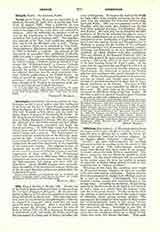

Offa, King of Mercia, d. July 29, 796. He was one of the leading figures of Saxon history, as appears from the real facts stripped of all legend. He obtained the throne of Mercia in 757, after the murder of his cousin, King Aethelbald, by Beornraed. After spending fourteen years in consolidating and ordering his territories he engaged in conquests which made him the most powerful king in England. After a successful campaign against the Hestingi, he defeated the men of Kent at Otford (775); the West Saxons at Bensington in Oxfordshire (779); and finally the Welsh, depriving the last-named of a large part of Powys, including the town of Pengwern. To repress the raids of the Welsh he built Offa’s dyke, roughly indicating for the first time what has remained the boundary between England and Wales. Offa was now supreme south of the Humber, with the result that England was divided into three political divisions, Northumbria, Mercia, and Wessex. His next step was to complete the independence of Mercia by inducing the pope to erect a Mercian archbishopric, so as to free Mercia from the jurisdiction of the Archbishop of Canterbury. Hadrian I sent two legates, George and Theophylactus, to England to arrange for the transfer of five suffragan sees of Canterbury (viz. Worcester, Leicester, Lindsay, Elmham, and Dunwich) to the new Archbishopric of Lichfield, of which Higbert was first archbishop. This was effected at the Synod of Celchyth (787), at which Offa granted the pope a yearly sum equal to one mancus a day for the relief of the poor and for lights to be kept burning before St. Peter’s tomb. At the same time he associated his son Ecgferth with him in the kingship. He preserved friendly relations with Charlemagne, who undertook to protect the English pilgrims and merchants who passed through his territories. Many charters granting lands to various monasteries are extant, and, though some are forgeries, enough are genuine documents to show that he was a liberal benefactor to the Church. The laws of Offa are not extant, but were embodied by Alfred in his later code. The chief stain on his character is the execution of Aethelbert, King of the East Angles. In all other respects he showed himself a great Christian king and an able and enlightened ruler.
EDWIN BURTON

